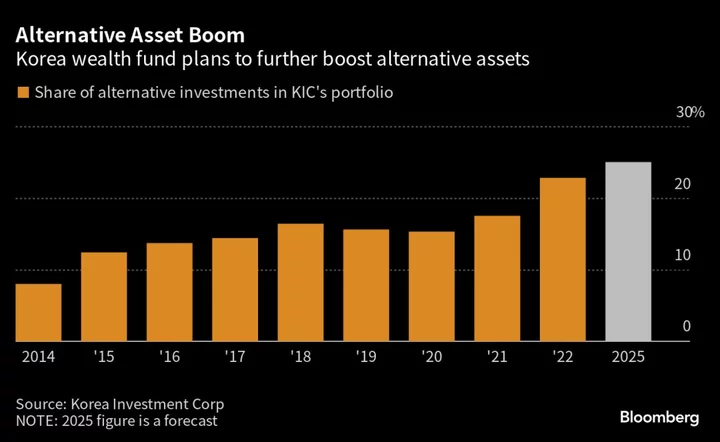South Korea’s $169 billion sovereign wealth fund has returned to gains this year, partially recovering from the double-digit losses of 2022 with increased bets on alternative assets to reduce volatility.
Korea Investment Corp. plans to allocate 25% of its assets in the category that includes private equity and credit, real estate and hedge funds by 2025, up from 22.8% as of the end of last year, Chief Executive Officer Seoungho Jin said in an interview with Bloomberg TV.
“We think the portfolio diversification is very important,” said Jin, who took the helm at the fund in 2021 after roles at the finance ministry and a presidential committee. Private credit is particularly promising and the fund plans to increase investment in the area, he added.
KIC, which lost about 14% last year in its worst showing since 2008 and only invests outside of Korea, has returned 5.4% in the first quarter and is set for gains of 7 to 8 percent for the current period, according to Jin. The performance for 2023 excludes alternative assets, which take time to tally.
KIC’s investment tactics reflect the challenges fund managers face as they navigate a world where interest rates have risen at a rapid pace. While the Federal Reserve put its tightening campaign on pause, Chair Jerome Powell said cuts are probably a couple of years out and the European Central Bank may raise interest rates in July. Heightened tensions between the world’s two-largest economies are reshaping global supply chains.
Private credit, which involves a business getting money from a fund rather than a bank, has mushroomed into a roughly $1.5 trillion global industry. With banks tightening their lending standards following this year’s financial sector turmoil, data provider Preqin Ltd. sees the asset class topping $2 trillion by 2027.
On traditional assets, Jin said global interest rates need to be lower than where they are now for equities to rally further. Until that takes place — investors surveyed by Bloomberg said the Fed probably won’t cut until 2024 — the fund favors fixed income for their high yields.
“If interest rates don’t fall significantly, the current level is very attractive,” he said, adding that investment ratios for stocks and bonds will be adjusted in proportion as the fund pivots toward alternative assets. The fund expects a “soft landing” of the US economy in the second half as it sees “strong household and business fundamentals.”
On China, which is South Korea’s largest trading partner, Jin said there are “mid to long-term uncertainties” as its economy slows.
“There may be cyclical factors and also there are structural factors like the changes in demographics and problems in the real estate sector and other external factors like the decoupling of the US and China,” he said. We are in a “wait and see” mode, he said, adding that the decoupling is one of most important risk factors facing the global economy.
The Seoul-based fund was founded in 2005 and has overseas offices in New York, London San Francisco and Singapore. It’s now planning to set up an office in Mumbai in November. India has “a lot of investment opportunities” including in infrastructure and venture start-ups, Jin said.
In a wide-ranging interview, Jin also said:
- India: The fund plans to boost investment and initially start with three staff members. It doesn’t currently have a specific target of how much it’ll allocate.
- KIC is interested in investing in Japan, but the country isn’t an easy market for foreign companies access
- Interested in Asia because of booming economies, but exchange rate fluctuations are a problem. Very interested in India, Australia and Southeast Asian economies including Vietnam and Indonesia.
--With assistance from Shinhye Kang, Katria Alampay and Youkyung Lee.
Author: Kyungji Cho, David Ingles and Daedo Kim

